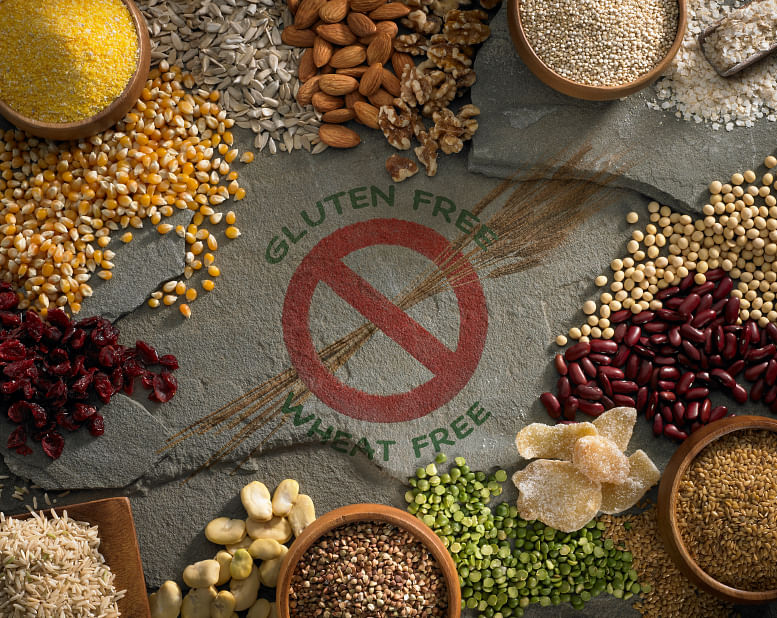Everything You Wanted to Know About Gluten, But Were Afraid to Ask
Confused between the world of gluten and gluten-free? We are here to answer all your questions.
What is Gluten?
Gluten is a protein in wheat, which is also found in grains like barley, rye and some oats.
What is a Celiac Disease?
It is an autoimmune disorder that occurs in genetically predisposed people where the ingestion of gluten leads to damage in the small intestine. It is estimated to affect 1 in 100 people worldwide.
Besides gluten-free foods being a life saving alternative for those with a diagnosed celiac condition, many are also embracing the diet as a lifestyle option.

Does a Gluten-Free Diet Help in Weight Loss?
Not with the commercially available gluten-free alternatives. However as your food options get limited if you avoid wheat or gluten, you may end up eating lesser than normal and therefore, lose weight. But if you replace wheat chapattis or breads etc. by gluten-free alternatives, chances are you will gain weight due to the high percentage of refined starch in commercially available gluten-free alternatives.
Does a Gluten-Free Diet Improve Stamina and Energy?
Not exactly a direct correlation! However, if you replace wheat, breads and bakery with healthier foods like millets including ragi, amaranth, oats, quinoa, brown rice, fruits and vegetables; you will certainly feel better. But don’t be too selective, we caution: consuming only one cereal grain as a staple can also make you more sensitive to it! Consuming a variety, helps.
Is Gluten-Free Food Healthier Than the Regular Fare?
This depends on what you substitute for gluten or wheat. Commercially available gluten-free foods can be rather refined, high on starch and low on nutrients. However, if you choose whole grains like ragi, amaranth, quinoa, brown rice, vegetables, fruits, low fat dairy, nuts and seeds, you will be better nourished. Gluten-free food alternatives at home without margarines and hydrogenated fats can certainly save you from harmful TFAs (trans fatty acids).
If I Stop Eating Wheat and Feel Good, Does it Mean I Have Wheat Allergy?
Wheat allergy and celiac disease are two different conditions. Celiac disease is only confirmed when both blood tests and biopsy are positive. If they are negative and you feel better without eating wheat or gluten, you are likely to be wheat intolerant and not celiac. Individuals with confirmed celiac disease are intolerant to gluten.
Should I Stop Eating Gluten if my Body Suffers From Gluten-Intolerance?
If you feel uncomfortable, bloated or low in energy because of wheat or gluten, do not remove it from your diet as that may camouflage symptoms of a celiac disease. Continue eating gluten containing foods such as bread, pasta and cereals during the diagnosis process. If you have already removed gluten from your diet, you must re-introduce it for atleast six weeks before any diagnostic tests are performed. If you stop eating wheat or gluten, the condition may be hidden and result in a negative test. You must get an investigation for the same under the guidance of a qualified physician.
Can I Have Gluten Cheat Days if I have a Celiac Disease?
A confirmed diagnosis requires a strict gluten-free diet for life, even if there are no symptoms upon ingesting gluten. There is no room for occasional gluten intake. ‘Accidental’ consumption and contamination are, howver, separate issues.
How do I know if I Suffer from a Celiac Disease?
Bloating, diarrhea, nausea, constipation, tiredness, anaemia, mouth ulcers, headache, sudden or expected weight loss, hair loss, skin rash (dermatitis herpetiformis), short stature, osteoporosis, depression, infertility, recurrent miscarriage and joint/bone pains are all symptoms of a celiac disease.
With increasing awareness about celiac disease and gluten-free diets in India, gluten-free foods can be found easily in supermarkets, health food stores and pharmacies across the country.